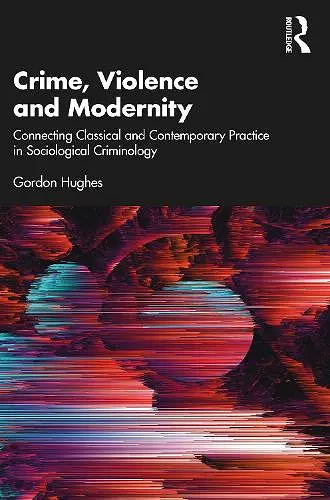Crime, Violence and Modernity
Connecting Classical and Contemporary Practice in Sociological Criminology
Format:Paperback
Publisher:Taylor & Francis Ltd
Published:27th Apr '22
Currently unavailable, and unfortunately no date known when it will be back
This paperback is available in another edition too:
- Hardback£145.00(9780367768973)

This bookmakes an original contribution to reconnecting criminological inquiry to the core concerns of the classical sociological imagination and to the intellectual resources of comparative and historical sociology. Throughout the book Hughes challenges the long-standing division of labour in criminology and sociology more generally between ‘theory’, ‘method’ and ‘research’. Accordingly, the author’s concerns here are as much about the craft and working methods of being a sociological criminologist as it is about theory and concepts.
In the first half of the book, the key conceptual and methodological premises of the classical sociological tradition are outlined and the latter’s potential for revitalizing contemporary criminological research-theorizing are assessed. These chapters also address the debate regarding the relationship between crime and violence, and that of modernity and the Western ‘civilizing process’. In the second half of the book, three areas of current criminological inquiry are explored through the lens of the long-term, process-oriented and radically relational perspective of contemporary Weberian and Eliasian scholarship. Among the areas of comparative investigation explored here are street crime, gangs and urban violence, genocide and murderous ethnic cleansing, warfare, colonialism and human rights.
Written in a clear and direct style this book will appeal to students and scholars of criminology, sociology and all those interested in what a sociological lens brings to the practices of contemporary criminology.
This is an outstanding book that reconnects and bridges the space between criminology and sociology. It not only develops a signal reconsideration of crime, violence and modernity, but also makes an intellectually scintillating contribution to understanding and appreciating the increasing relevance of sociological ‘criminology’ to wider social science globally. A brilliant book which deserves to be read and engaged with widely.
William Housley, Professor of Sociology, Cardiff University, Wales, UK
This is an outstanding book that reconnects and bridges the space between criminology and sociology. It not only develops a signal reconsideration of crime, violence and modernity, but also makes an intellectually scintillating contribution to understanding and appreciating the increasing relevance of sociological ‘criminology’ to wider social science globally. A brilliant book which deserves to be read and engaged with widely.
William Housley, Professor of Sociology, Cardiff University, Wales, UK
"The significance of this book lies in its intellectually sophisticated and stimulating account of how ‘sociological criminology’ can flourish by reconstituting the classical-contemporary social scientific nexus to make sense of social (and criminal) complexities, with particular focus on crime and violence. There is no better guide on this intellectual journey than Hughes, who has produced an authoritative, readable and highly relevant work characterised by a detailed examination of the dynamics of theory, method and research within the production of knowledge on social bads."
Nicholas Lord, Professor of Criminology, School of Social Sciences, University of Manchester
This wish to move beyond a hermetically sealed criminology is at the heart of the book. Professor Hughes is on firm ground in challenging the view that criminology cannot flourish as a separate discipline unless it engages with this ‘sociological turn’, because all the evidence confirms that crime is generated as a consequence of persistent cross-generational inequalities.
Robert Mears, Professor of Sociology, Bath Spa University
Even over its core concepts, criminology today is riven with interdisciplinary and internecine disputes that obscure more than they reveal. Gordon Hughes’s well-argued and equally well-demonstrated case for a sociological criminology that reconnects with its classical Eliasian and Weberian past provides a remarkably clear, timely and important path to enlightenment.
Dan Gilling, Reader in Criminology, University of Plymouth
ISBN: 9780367768942
Dimensions: unknown
Weight: 560g
242 pages